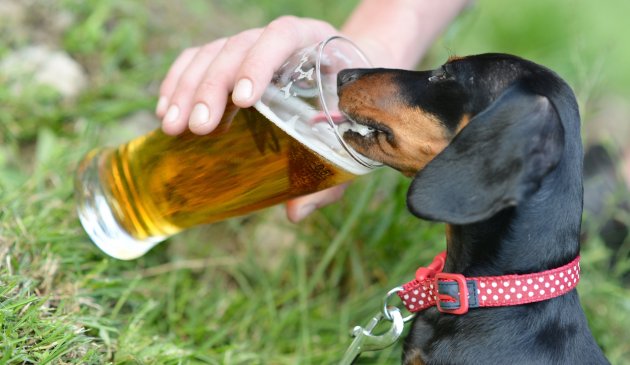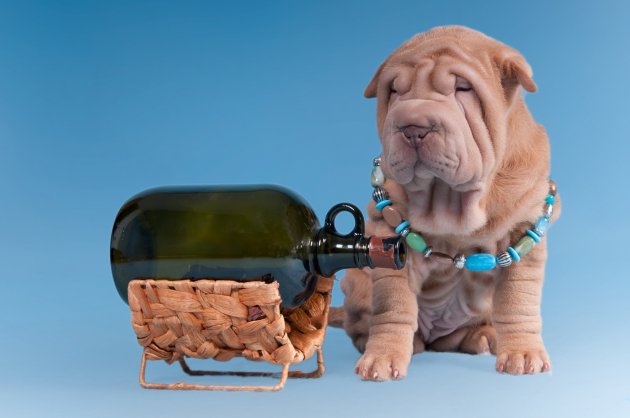I had an aunt that would regularly give her miniature poodle the remains of her beer (those were the days when beer always came in bottles). Tricksie (dog, not aunt), would happily roll around on the ground with her tongue stuck as far down the neck of the bottle as it could possibly go - she loved it!
But was my aunt doing her prized pooch any favors? The answer is no! Let's discover some facts on the topic of alcohol and dogs.
Do Dogs Like Alcohol?
For the most part, dogs do not like the taste of alcohol, and therefore will not seek it out as part of their daily intake. Although science doesn't really know for sure why dogs dislike these boozy drinks, they do know that the dog's sense of smell is considerably better than humans (we have around six million olfactory receptors in our nose, dogs have approximately 300 million). With a much superior sense of smell, the powerful aroma of alcohol may not be pleasing to most pooches.
So why was Tricksie so attracted to beer? Some animals do possess a sweet tooth, so she was most likely after the sugars and hops present in this beverage.

Can Dogs Drink Beer?
Even though Tricksie did lick the dribbled remains of my aunt's beer, this was a dangerous practice for the pooch. Beer contains water, grains, yeast, and hops. Among these four ingredients, hops is the culprit which has the potential to do the most damage in dogs. Although the exact "mechanism for toxicity" is still unknown, scientists have identified that all forms of the hops plant can be deadly to the canine species.
The physical symptoms of a dog that has consumed beer are;
- Vomiting/Diarrhea
- Panting/Elevated heart rate
- Fluctuations in body temperature
- Agitation
What you don't see with the physical symptoms is the damage to the dog's kidneys that can occur. Please do not give your dog beer, no matter how little the amount!
Can Dogs Drink Wine?
Just like beer, wine is also dangerous to dogs. Compared to beer, wine may be more palatable to a dog due to its high sugar content. However, wine is made from grapes, which are seriously toxic to dogs.
Once again, the exact chemical present in the grape that is toxic to the canine species has yet to be identified; however, veterinarians do know what the end result is;
- Vomiting/Diarrhea
- Abdominal pain
- Legarthy
- Tremors
- Seizures
- Coma
- Death
Not all dogs will suffer symptoms of poisoning from grapes (raisins and wine); however, those that do can also suffer from kidney damage which could lead to acute or sudden kidney failure and loss of urine production.
It's not a good idea to feed your dog wine or allow him to lap up any spilled wine.
Can Dogs Drink Whisky or Other Strong Alcohol?
Whiskey and other strong alcohols (rum, gin, bourbon, etc.,) should never be fed to a dog. Due to the intense alcohol content in whiskey (around 50%) this makes it the most dangerous of all alcoholic beverages. The good thing is an animal would not be naturally inclined to consume it. The problem comes when these strong alcohols are mixed with juice or soda because it has now turned the hard liquor into a sweet treat.
The symptoms of alcohol toxicity with whiskey are the same as with beer and wine, but due to the sheer percentage of alcohol in the hard liquors, it will take a smaller amount to put your dog in a state of toxicity.
Can Dogs Get Drunk?
Some folks may think it's funny to feed a dog alcohol then watch it take its effects on the poor unsuspecting creature. This is a cruel and dangerous trick. Yes. Dogs can get drunk, and it doesn't take much alcohol for it to become inebriated.
Animals will feel the effects of alcohol much faster than humans for two main reasons;
- Dogs are much smaller than humans
- Our family pets are not conditioned to drink alcoholic beverages.
Just like humans, a dog that has ingested alcohol may have difficulty standing, walking, and experience a lack of coordination. If your pet has consumed a lot of alcohol, it can lead to incontinence, drowsiness, irritability, flatulence, and more dangerous symptoms like seizures, comas, and even death.
Don't go for a laugh, or "hits" on social media by allowing your dog to drink alcohol. It's not only dangerous, but it's also just flat-out cruel!
Drunk Dog? May Not Be Alcohol
If your dog is acting like it's drunk and you know it hasn't been exposed to alcohol, you will need to look for other sources. Many pet parents are unaware that there are household items that also contain alcohol. These include any foodstuff that can (or will) ferment like bread dough, or rotting apples - if your pooch likes to rummage around in the garbage, these can be hazardous.
Products such as cough medications and mouthwash, perfumes/colognes, some cleaning products, Pharmaceuticals, inks/dyes, hand sanitizer, rubbing alcohol or any product that contains ethanol can also make your dog appear as those he is drunk.

Signs of a Drunk Dog
We know why alcohol is dangerous to dogs, so know the signs if your pooch has accidentally consumed this type of beverage. Here are the most common effects of alcohol on dogs;
Changes in Behavior: Depending on the size of your dog and how much alcohol he has consumed, he can quickly exhibit impaired mental faculties. This can result in depression, aggression, or elimination in the house.
Problems/Changes in His Breathing: Alcohol (even small amounts) can affect your dog's rate-of-respiration. This can result in excessive panting and an increased heart rate.
Heart Issues: Whether your pooch licked up a bit of alcohol or downed a dish-full, it can affect his heart resulting in heart murmurs and even a heart attack.
Kidney Damage: Although you probably wouldn't know it, your dog's kidneys could be under attack from the alcohol. This is because they will have to work harder to filter the toxin out of your pet's body, which can lead to damage or complete shut-down of this vital organ
Sudden Death: Extreme toxicity can lead to either a quick death or one that is slow due to the damage of your pet's heart and kidneys.
What To Do If Your Dog Drinks Alcohol
The first thing you must do if your dog has consumed alcohol is to determine what type of alcohol it is and how much he has ingested. Here is a list of common alcohols from least to most toxic;
- Light beers
- Craft beers
- Wine
- Hard liquors
- Grain alcohols
If there is no alcohol present, be on the lookout for those other substances we mentioned earlier that may contain ethanol.
The next step to take is to call your veterinarian. Tell them you suspect your pooch may have ingested alcohol, how much they swallowed, and what source the alcohol was from, for example, beer, wine, or another ethanol substance. Be sure to grab the packaging or bottle/can of what your dog ingested, as this helps the vet team know precisely what they are dealing with.
Wrap your dog up in a blanket or towel and get to your vet's office ASAP.
Treatment of Alcohol Toxicity in Dogs
Once you arrive at your veterinarian's office, they will first take your pet's vitals to determine its heart rate and respiratory levels. The team will also look at your pet's outward symptoms (mentioned earlier)
Your vet will then take blood from your canine companion and run a test to determine the amount of alcohol toxicity present in your dog's system. From there the veterinarian will determine a course of action.
If the alcohol was ingested under 40 minutes before your arrival, they might decide to induce vomiting to rid the alcohol from your pet's stomach before it begins to filter throughout the body.
Because the side effects of alcohol poisoning is a decrease in body temperature, respiratory distress, and low blood sugars, these will be quickly seen to help get your pooch back on the right physical path.
For severe toxicity, your dog may be put on intravenous fluids to replace its electrolytes, flush out its kidneys, so they can return to normal functioning levels, as well as deal with any dehydration that may have taken hold. For extreme cases, a tracheal intubation and seizure medication may also have to be administered.
Dogs & Alcohol? Just Say 'No!'
There is absolutely no reason to give your dog alcohol. It's not fun or funny, and it should never be done for any reason. It will not calm your pet (there are other safer ways to calm a hyper dog, ask your vet) and the risks are high for toxicity. Dogs that have consumed alcohol or any product that contains ethanol need to be given immediate veterinarian attention.
Our dogs are members of the family that trust us with their very lives; let's honor that privilege by giving them the best care possible.
For More Information:
- Rover.com, Can My Dog Drink Alcohol?
- petMD, Alcohol Risks for Pets